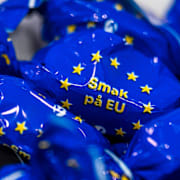
Abir Al-Sahlani: Det är dags för EU att agera
EU-kommissionens årliga rättsstatsrapport bör utvidgas och undersöka länders demokrati, skriver Europaparlamentariker Abir Al-Sahlani (C) i en debattartikel i Altinget.
Hon anser att de länder som inte lever upp till kravet att följa mänskliga rättigheter bör få kännbara konsekvenser. Odemokratiska regimer ska inte försörjas av svenska skattepengar, skriver hon.
”Det är dags att agera. EU-kommissionen måste bli bättre på att löpa linan ut och dra medlemsländer som inte följer reglerna inför EU-domstolen”, skriver hon.
Om debattören
Abir Al-Sahlani (C) är ledamot i Europaparlamentet under mandatperioden 2019-2024.
Läs mer
bakgrund
Europeiska unionen
Wikipedia (en)
The European Union (EU) is a political and economic union of 27 member states that are located primarily in Europe. Its members have a combined area of 4,233,255.3 km2 (1,634,469.0 sq mi) and an estimated total population of about 447 million. The EU has developed an internal single market through a standardised system of laws that apply in all member states in those matters, and only those matters, where members have agreed to act as one. EU policies aim to ensure the free movement of people, goods, services and capital within the internal market; enact legislation in justice and home affairs; and maintain common policies on trade, agriculture, fisheries and regional development. Passport controls have been abolished for travel within the Schengen Area. A monetary union was established in 1999, coming into full force in 2002, and is composed of 19 EU member states which use the euro currency. The EU has often been described as a sui generis political entity (without precedent or comparison).The EU and European citizenship were established when the Maastricht Treaty came into force in 1993. The EU traces its origins to the European Coal and Steel Community (ECSC) and the European Economic Community (EEC), established, respectively, by the 1951 Treaty of Paris and 1957 Treaty of Rome. The original members of what came to be known as the European Communities were the Inner Six: Belgium, France, Italy, Luxembourg, the Netherlands, and West Germany. The Communities and their successors have grown in size by the accession of new member states and in power by the addition of policy areas to their remit. The latest major amendment to the constitutional basis of the EU, the Treaty of Lisbon, came into force in 2009.
On 31 January 2020, the United Kingdom became the first member state to leave the EU. Following a 2016 referendum, the UK signified its intention to leave and negotiated a withdrawal agreement. The UK is in a transitional phase until at least 31 December 2020, during which it remains subject to EU law and part of the EU single market and customs union. Before this, three territories of member states had left the EU or its forerunners, these being French Algeria (in 1962, upon independence), Greenland (in 1985, following a referendum) and Saint Barthélemy (in 2012).
Containing some 5.8% of the world population in 2020, the EU (excluding the United Kingdom) had generated a nominal gross domestic product (GDP) of around US$15.5 trillion in 2019, constituting approximately 18% of global nominal GDP. Additionally, all EU countries have a very high Human Development Index according to the United Nations Development Programme. In 2012, the EU was awarded the Nobel Peace Prize. Through the Common Foreign and Security Policy, the union has developed a role in external relations and defence. It maintains permanent diplomatic missions throughout the world and represents itself at the United Nations, the World Trade Organization, the G7 and the G20. Due to its global influence, the European Union has been described as an emerging superpower.
Omni är politiskt obundna och oberoende. Vi strävar efter att ge fler perspektiv på nyheterna. Har du frågor eller synpunkter kring vår rapportering? Kontakta redaktionen



